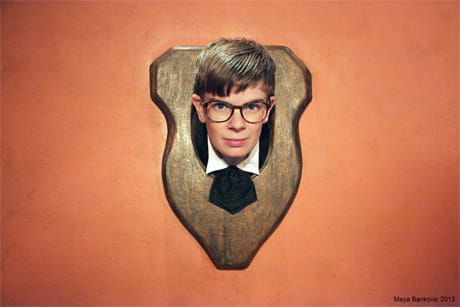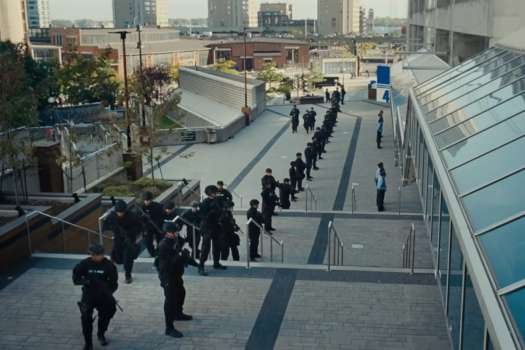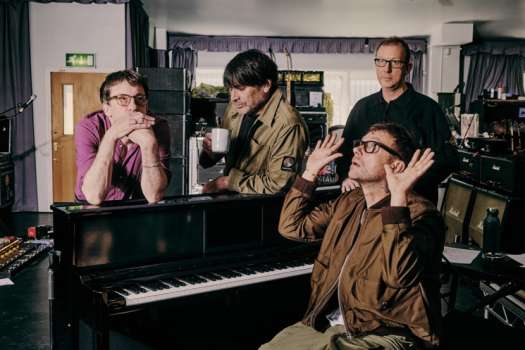When transgender musician and author Rae Spoon released I Can't Keep All of Our Secrets last year, buzz was already growing for another project, the score and soundtrack to a National Film Board documentary about coming of age in an evangelical Christian family during the '90s, directed by Chelsea McMullan. The documentary and album are both called My Prairie Home, and as Spoon reveals to Exclaim! from Montreal, the effort was years in the making.
What came first, the documentary or the album?
I wrote the album before we filmed the documentary, but I wrote it knowing it was for the documentary. We'd been working on the documentary for three or four years. I even wrote My Prairie Home before my last album. [I Can't Keep All Of Our Secrets] came out because we were filming the whole time. I just spent the last few years revisiting growing up.
How did the documentary come to be? Are you and Chelsea McMullan friends?
I didn't know Chelsea before she approached me to do the score for her last documentary [Deadman], which was also for the National Film Board, so we got to know each other through making music for the other soundtrack. Deadman is about a man who builds a ghost town near Kamloops. I think Chelsea approached me because I'm from the prairies and I used to play country music. We've worked on various music videos together but the documentary has been the main thing.
Themes of place, landscape, religion and identity are very apparent on this album. Do you plan for themes or do they emerge amidst in the songwriting process?
I wasn't sure how the themes were going to come out. I wrote the song "This Used to Be the Bottom of the Ocean" and it has dinosaurs and stuff in it, and then we ended up filming in the Royal Tyrrell Museum. Some of the songs started out with a theme in mind and some of them ended up making themes themselves. I definitely wanted to capture the feeling of coming out in Alberta in the '90s as a high school student in an evangelical family, and how it was to grow up in Alberta at that time.
Of all your albums, My Prairie Home deals most specifically with your experience of coming out as queer while growing up in Alberta. Why now?
I guess I have a bit of distance from it. I might have graduated from high school like, 15 years ago? And part of the distance is in that I live in Montreal now. I was trying to capture the stories in songs, and I have very vivid memories of what it's like to come out without any support, before a time when there weren't any GSA's or anything like that. I'm involved with youth in Alberta and I think those issues stay close to me even though I'm not a youth anymore. I realized that my experience would probably still apply to a lot of situations, even though it was a while ago.
Did the process of writing for the film influence the visual landscapes in your songs?
I think it did, especially with the instrumental stuff that I wrote for the film as the score. Any parts of the album that don't have singing on them were just parts that go under the film. I felt that it was kind of urgent to capture the stories correctly. I was trying to represent this complicated mess of a childhood, so I felt this sort of urgency to write songs like "God Was On Your Shoulders" — to write things that are simple about things that are complicated. When you're being represented by a film, you want to make sure you're representing things as they feel true to you. So that it's working with things that I feel are true.
Many of these songs deal with humanly difficult topics, such as death, abuse, and coming out as queer during high school, while sonically coming across as light and sometimes cheerful. Was this contrast intentional?
I definitely try to write more upbeat musical songs about things that are heavier because I think it's too much sometimes to have the combination of heavy music with heavy lyrics.
Did you return to Calgary to write My Prairie Home"?
I returned to Calgary to film, but I think I wrote most of it in Montreal, which is something I often end up doing; I wrote an album about Canada while I was living in Germany. I think it's nice to have distance from a place to write about it.
You brought "Love is a Hunter" back for this album.
The director of the documentary loves "Love Is A Hunter" and wanted it in the film, so we brought it back and redid it. It's one of the main themes in the film. There's this big music video around it, which is epic and involves me running through the forest in hunting gear [laughs]. It's kinda cool. She wanted that song so I kind of had to reinvent it, which I'm happy with. I tried to use a lot of strings, like cellos and things you'd see in films, like more of a cinematic arrangement.
What is it like being in front of the camera for a full-length documentary? Is it a level of performance you're comfortable with?
It's really weird. Especially when it's a musical about you. I didn't think that I'd have a documentary made about me, ever. And I also think I might be kind of young to have one. I'm 32, so I'm like, "Well, I guess I'm done now!" [Laughs] I don't know if anyone actually could get used to being on film.
There's a lot of instrumental diversity on this album. Are you planning on carrying that diversity with you on tour this fall?
I think I'm going to tour with a drummer for as many shows as I can to keep that rock feel. Between the drummer and I, I think we can probably cover most things. The arrangements will be a little bit different because I won't have a live cello player or trumpet or anything like that, but I'm hoping to staying true to have a diverse sound live. I'm sure I'll build on it, starting out with the quieter stuff and building up to the dance stuff.
Going back to the documentary, have you seen the final cut?
Yeah, I've seen it. It's coming out in the fall. I'm just waiting to hear where they're launching it, they're not quite sure yet, but it'll definitely come out in the fall. But yeah, I've seen it. They've been editing since last November.
What came first, the documentary or the album?
I wrote the album before we filmed the documentary, but I wrote it knowing it was for the documentary. We'd been working on the documentary for three or four years. I even wrote My Prairie Home before my last album. [I Can't Keep All Of Our Secrets] came out because we were filming the whole time. I just spent the last few years revisiting growing up.
How did the documentary come to be? Are you and Chelsea McMullan friends?
I didn't know Chelsea before she approached me to do the score for her last documentary [Deadman], which was also for the National Film Board, so we got to know each other through making music for the other soundtrack. Deadman is about a man who builds a ghost town near Kamloops. I think Chelsea approached me because I'm from the prairies and I used to play country music. We've worked on various music videos together but the documentary has been the main thing.
Themes of place, landscape, religion and identity are very apparent on this album. Do you plan for themes or do they emerge amidst in the songwriting process?
I wasn't sure how the themes were going to come out. I wrote the song "This Used to Be the Bottom of the Ocean" and it has dinosaurs and stuff in it, and then we ended up filming in the Royal Tyrrell Museum. Some of the songs started out with a theme in mind and some of them ended up making themes themselves. I definitely wanted to capture the feeling of coming out in Alberta in the '90s as a high school student in an evangelical family, and how it was to grow up in Alberta at that time.
Of all your albums, My Prairie Home deals most specifically with your experience of coming out as queer while growing up in Alberta. Why now?
I guess I have a bit of distance from it. I might have graduated from high school like, 15 years ago? And part of the distance is in that I live in Montreal now. I was trying to capture the stories in songs, and I have very vivid memories of what it's like to come out without any support, before a time when there weren't any GSA's or anything like that. I'm involved with youth in Alberta and I think those issues stay close to me even though I'm not a youth anymore. I realized that my experience would probably still apply to a lot of situations, even though it was a while ago.
Did the process of writing for the film influence the visual landscapes in your songs?
I think it did, especially with the instrumental stuff that I wrote for the film as the score. Any parts of the album that don't have singing on them were just parts that go under the film. I felt that it was kind of urgent to capture the stories correctly. I was trying to represent this complicated mess of a childhood, so I felt this sort of urgency to write songs like "God Was On Your Shoulders" — to write things that are simple about things that are complicated. When you're being represented by a film, you want to make sure you're representing things as they feel true to you. So that it's working with things that I feel are true.
Many of these songs deal with humanly difficult topics, such as death, abuse, and coming out as queer during high school, while sonically coming across as light and sometimes cheerful. Was this contrast intentional?
I definitely try to write more upbeat musical songs about things that are heavier because I think it's too much sometimes to have the combination of heavy music with heavy lyrics.
Did you return to Calgary to write My Prairie Home"?
I returned to Calgary to film, but I think I wrote most of it in Montreal, which is something I often end up doing; I wrote an album about Canada while I was living in Germany. I think it's nice to have distance from a place to write about it.
You brought "Love is a Hunter" back for this album.
The director of the documentary loves "Love Is A Hunter" and wanted it in the film, so we brought it back and redid it. It's one of the main themes in the film. There's this big music video around it, which is epic and involves me running through the forest in hunting gear [laughs]. It's kinda cool. She wanted that song so I kind of had to reinvent it, which I'm happy with. I tried to use a lot of strings, like cellos and things you'd see in films, like more of a cinematic arrangement.
What is it like being in front of the camera for a full-length documentary? Is it a level of performance you're comfortable with?
It's really weird. Especially when it's a musical about you. I didn't think that I'd have a documentary made about me, ever. And I also think I might be kind of young to have one. I'm 32, so I'm like, "Well, I guess I'm done now!" [Laughs] I don't know if anyone actually could get used to being on film.
There's a lot of instrumental diversity on this album. Are you planning on carrying that diversity with you on tour this fall?
I think I'm going to tour with a drummer for as many shows as I can to keep that rock feel. Between the drummer and I, I think we can probably cover most things. The arrangements will be a little bit different because I won't have a live cello player or trumpet or anything like that, but I'm hoping to staying true to have a diverse sound live. I'm sure I'll build on it, starting out with the quieter stuff and building up to the dance stuff.
Going back to the documentary, have you seen the final cut?
Yeah, I've seen it. It's coming out in the fall. I'm just waiting to hear where they're launching it, they're not quite sure yet, but it'll definitely come out in the fall. But yeah, I've seen it. They've been editing since last November.




